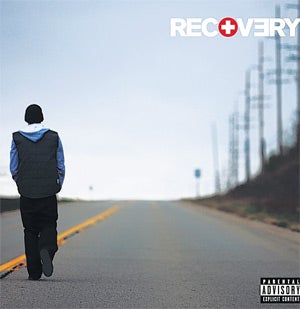Album: Eminem, Recovery, (Aftermath/Interscope)

Perhaps Eminem's single most impressive achievement has been to shift hip-hop's focus from being primarily concerned with sociological issues, into the murkier realm of psychology.
But while it was a long overdue change when he first broached the matter on The Marshall Mathers LP – by which time one's overwhelming response to rappers' tedious criminal attitudinising had long since switched from "What?" to "Why?" – it doesn't seem quite as fascinating several albums on. If we're being brutally frank, I think we already know far more about Eminem's private life and his alleged mental torment than is probably healthy for us, let alone the rapper himself.
If last year's Relapse was effectively "The Slim Shady LP Part 2", reprising the bonehead horror-comic fantasies of his debut album, then Recovery is "The Marshall Mathers LP Part 2", burrowing again as it does into its author's psycho-pathology, with a brusque contempt for the usual niceties and conventions of the therapist's couch. The trouble is, there's nothing here quite as witty or engaging as "The Real Slim Shady" or "I'm Back", nor as aggressively self-cauterising as "The Way I Am". Instead, he pinballs back and forth between self-pitying pathos and brutal vindiction, a sort of bipolar resentment that sees him surging from self-disgust ("I'm a shit stain on the underwear of life") to chippy aggression ("How fuckin' irritated are you, how much in your face am I?") and back again, constantly throughout the album.
Sometimes, he makes that journey in the space of a few lines, as in "Talkin' 2 Myself", where his plaintive "Why in the world do I feel so alone?" is immediately answered, "Instead of feeling sorry for yourself, do something about it." You can all but see the warring sides of his character, like two little figures perching on his shoulders, pulling him apart.
The same applies to his relationship with on/off partner Kim, derogated in "25 to Life" as a "selfish bitch", while elsewhere he admits his lingering affection for the mother of his daughter, which along with the death of a friend triggers the suicidal impulse voiced in "Going Through Changes". "Maybe that's what happens when a tornado meets a volcano," he offers as an excuse for their mutual mistreatment in "Love the Way You Lie".
But any sympathy you might feel for the clearly troubled rapper is swiftly dispelled by the callous brutality of his attitudes elsewhere, particularly the tirade of vile misogynist abuse – not to mention the off-colour "jokes" at the expense of Michael J Fox's illness – in "Cold Wind Blows", where the self-styled "mean cocksucker" proclaims his nastiness with pride. Ultimately, the only completely commendable sentiment on the entire album comes in the proud rehab anthem "Not Afraid", where he determines to take control of his life and become borderline decent again. It's clearly an uphill task, not least because he unquestionably still exults in his outsider status, a nostalgie de la boue from which it may prove more difficult than he imagines to wriggle free.
DOWNLOAD THIS Not Afraid; Love the Way You Lie; Won't Back Down
Join our commenting forum
Join thought-provoking conversations, follow other Independent readers and see their replies
Comments
Bookmark popover
Removed from bookmarks